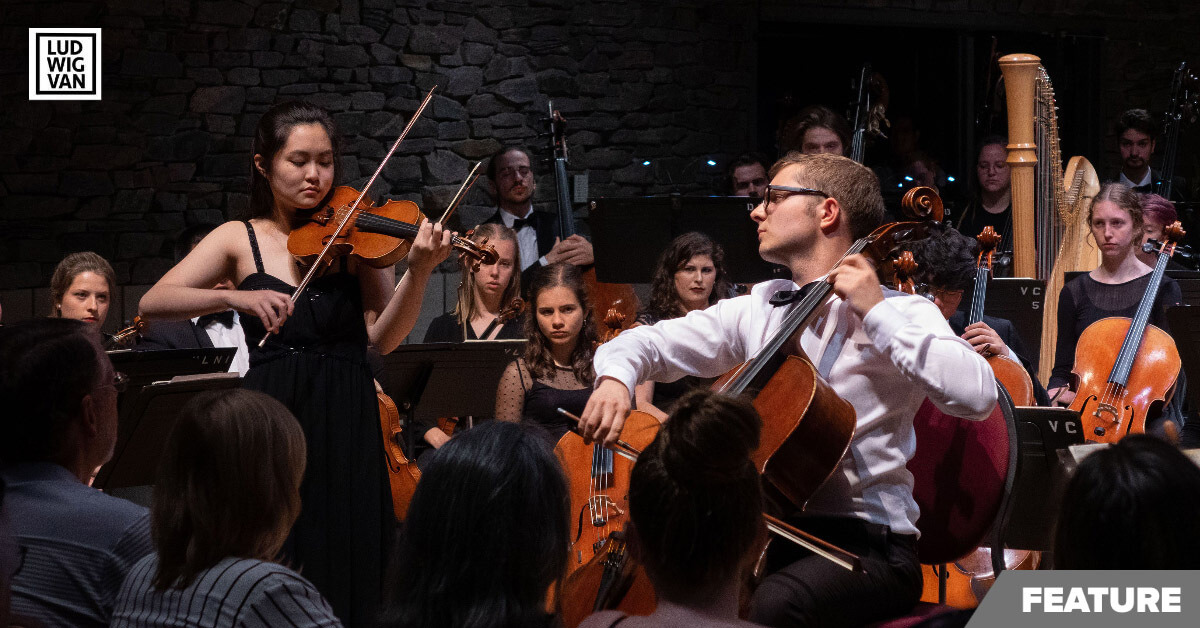
We often look back into youthful summer days with memories of slow daydreams extending right into the late nights with barely set sun, time relaxed and soaked with unstructured freedom. However, for the past 60 years, summer with National Youth Orchestra of Canada meant the polar opposite — a calendar full of bursting schedules and an annual grand orchestral tour, squeezing in practice whenever one can, with sleep that is way too short. This special program has been the centre of so many Canadian orchestral musicians’ lives, yet many have yet to hear about it. What is NYO Canada and how has it shaped our national and individual identities in Canadian classical music?
Gathering budding musicians from age 16-28 across the nation, National Youth Orchestra of Canada (NYO Canada), is one of our best national nurturing programs available for young Canadians.
The competition is fierce — in recent sessions, nearly 100 musicians (the exact numbers vary but the minimum is set at 92 members) were chosen from 500+ applications, for multi-dimensional orchestral training as documented in That Higher Level (2018, directed by John Bolton, for the National Film Board).
Founded in 1960 by Walter Susskind (1913-1980), the program initially focused on young musicians exploring symphonic program, with a short concert tour within selected regions of Canada. Early members remember that certain difficult works were presented only at the very final concert. The Short Sweet Summer (1963, produced by Norman Campbell), an in-depth CBC documentary of the 1963 session gives a lovely insight to NYOC’s early days.
Since then, NYO Canada has morphed into a comprehensive program, covering various subjects, including a chamber music program, orchestra-specific topics from business skills to audition preparation, and various health-related topics including physical and mental wellness programs, in addition to traditional training and the presentation of large-scale symphonic works. NYOC records at least one full length album every year, available through SoundCloud, and has been nominated for a Juno (Mahler’s 6th Symphony and Stravinsky’s Rite of Spring, 2009).
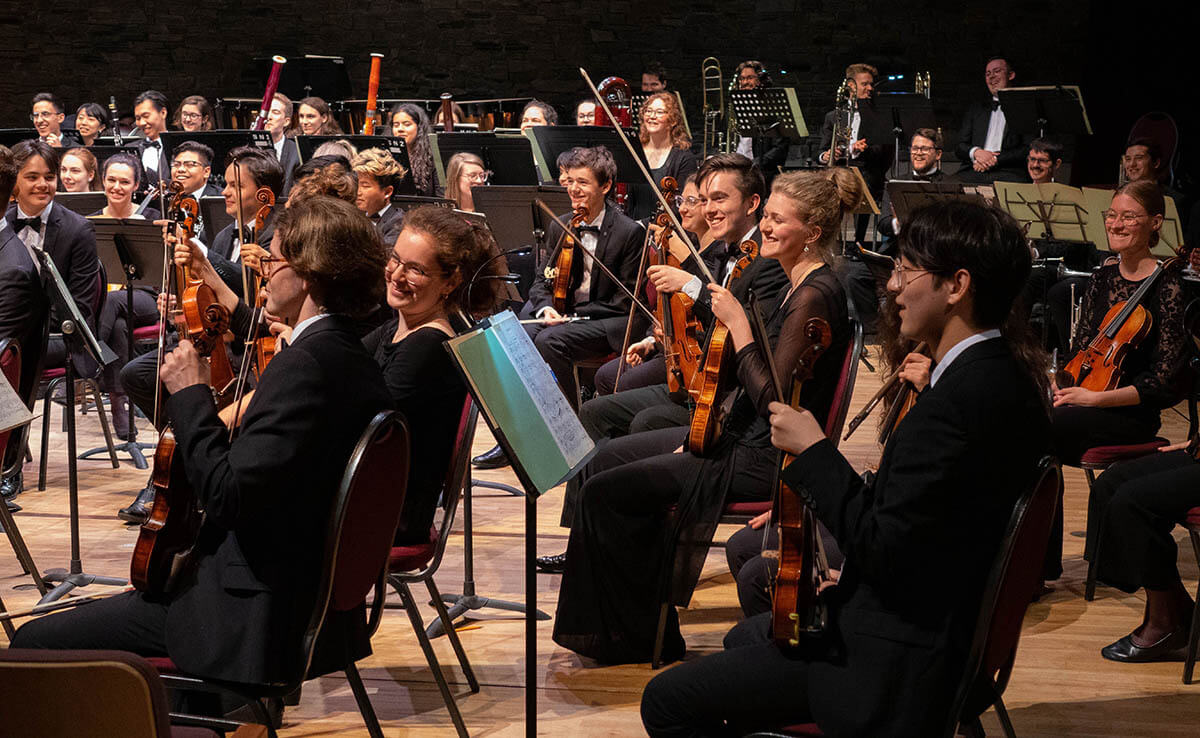
NYO Canada programs two large orchestral works, a concerto tied to the Michael Measure Prize, and one Canadian annual commission through a partnership with SOCAN; shorter works are then selected to complement these core selections. Past favourites include works by Mahler, Ravel, Stravinsky and Strauss, giving participants an experience of some of the richest works in the standard orchestral repertoire.
NYO Canada covers most of the costs related to the program (food and housing at the training location, and travel and accommodation during the tour), which is a great relief to the young musicians, as higher music training bills can adds up fast — from accessing and maintaining appropriate instruments to insurances, travelling, lessons, and often even to renting an appropriate practice space. The billing list is endless.
The musicians are responsible for their travel cost to/from the session, and food costs during the tour.To help cover these costs, a $1,200 Achievement Award is given to members after successful completion of the program. There are also additional prizes. the Canada Council for the Arts Michael Measures Prize, and NYO Canada Award of Excellence.
The annual audition portal is open from October to the end of January with a varying fee scale. Audition repertoire is specified per instrument, and applicants upload their video audition through YouTube. NYO Canada requires the auditionees to play without accompaniment, and that all materials should be played in the order specified, in a single take.
When the selected works have been rehearsed and refined, the musicians present the program to the general public in a tour (in the early days, certain works — particularly difficult works — were presented only once, at the final concert). This is significant, as it gives individuals an opportunity to overcome the challenges unique to live performances, including performance anxiety, acoustic variations and other logistical changes, as well as giving the orchestra an opportunity to refine itself as an ensemble.
So far, the largest Canadian tour was the 2017 Edges of Canada Tour. As part of Canada’s sesquicentennial signature event, NYO Canada toured Ottawa, Montreal, Toronto, Charlottetown, Halifax, Winnipeg, Saskatoon, Edmonton, Whitehorse, Nanaimo and Vancouver over 25 days.
The first international tour was in 1996 (Japan), and there were numerous visits to the United States (2008, 2011 and 2012). In 2013, selected 2012 participants toured to India for an international collaboration, and the most recent overseas touring regimen started in 2016 to Portugal, 2018 to Germany and Scotland, and in 2019, the Odyssey Tour to Spain, alongside hosting the European Union Youth Orchestra in Canada for the Frenergy Tour.
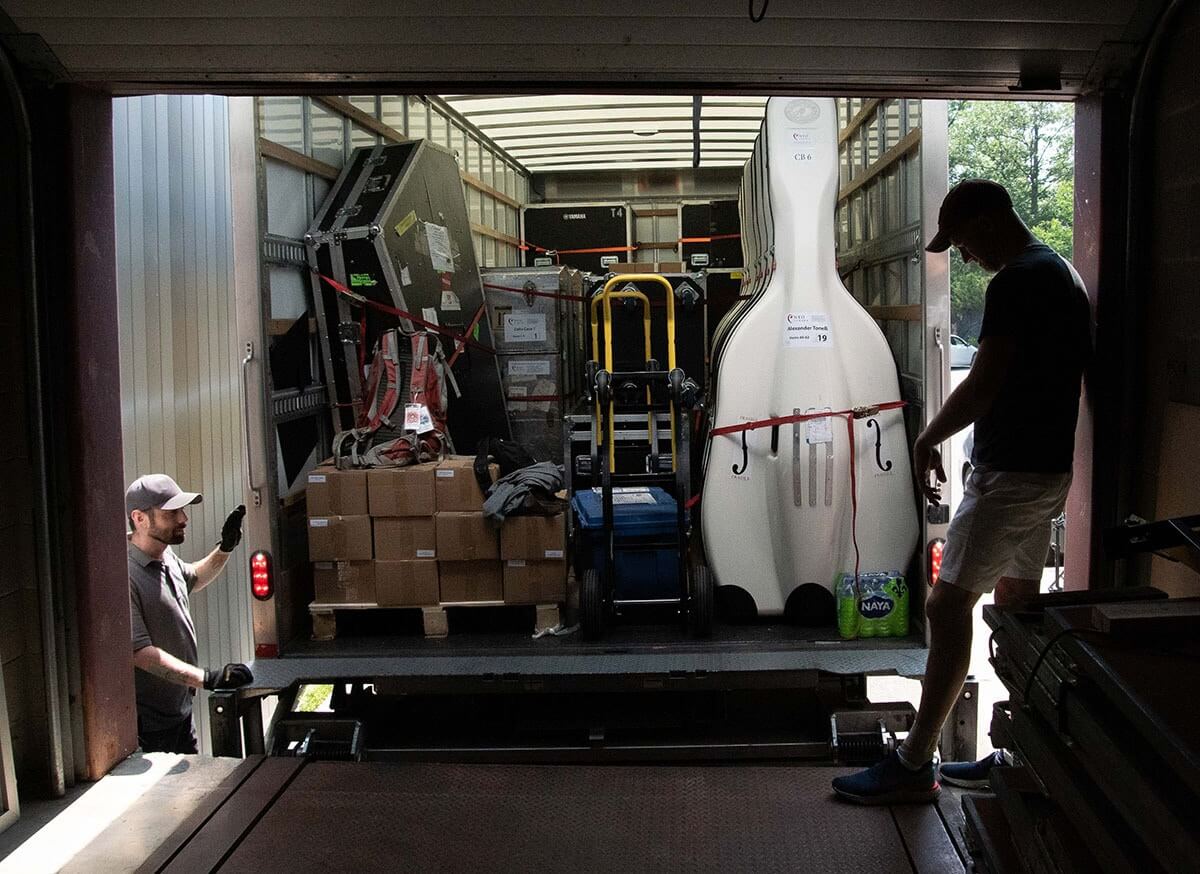
Jonathan Welmers – Director of Tours and Production
At the heart of this huge logistical puzzle is Jonathan Welmers, Director of Tours and Production, working for NYO Canada since late 2007. For the European portion of last year’s tour, Jonathan organized 101 seat bookings and over 122 check-in instruments and equipment (and an additional 75 instruments as hand luggage — this is ‘per leg’ of the journey — as well as having a key role in curating 9 days of Canadian experience for the 35 visiting EUYO members for Frenergy. Jonathan’s dedication — including learning everyone’s name for every session — is much appreciated and loved by all participants.
“The role I am currently in has sort of morphed from its original place of being a real logistics person (tour manager),” says Jonathan. “When I originally came to the job, I was coming from a production background doing indie rock shows around Toronto. It was a company that attempted to give a leg up to musicians who couldn’t go out and rent a bar and sort of hedged the risk across multiple bands. The company did shows initially just in Toronto, then expanded to Ontario, Canada, and then the US over a period of years. I saw the (NYO Canada) job listed on work in culture and applied… My classical background was nil at that time, but I managed to convince the organization that learning an orchestral plot would be easy enough to learn, but that relationship building and an agility of thinking was perhaps ultimately [what] would make someone good at the job.”
Working closely with both staff and participants, Jonathan is keenly aware of the importance of the program and the subsequent adaptation needs for the program. “I was never good enough to get into a program like NYO, so getting to experience it on the other side is a privilege,” says Jonathan. Seeing the participants’ passion up close, year after year, Jonathan is motivated to prove that, “The hype was worth it, so to speak.” A typical day can include a full concert day (10 a.m.-11.30 p.m.) in Ottawa, then loading the truck and driving through the night (11.30 p.m.-4 a.m.) to Toronto, for the load to be transferred from Toronto to Berlin, just in time for a rehearsal and a concert in Berlin.
He considers NYO Canada as a life-changing experience, “…not because of anything I think per se, but because every single person I’ve spoken to years and decades after their NYO experience tell me that.” He encourages young musicians to keep auditioning, even if one does not get in for many years. “I know players who failed many times and then got in. I’ve seen players go from the #1 auditionee one year, to #6 the next year, not because they got worse, but others got better. NYO is a real meritocracy, and as such, you always have a chance.”
The NYOC – A Big Part of Canada’s Orchestral Fabric
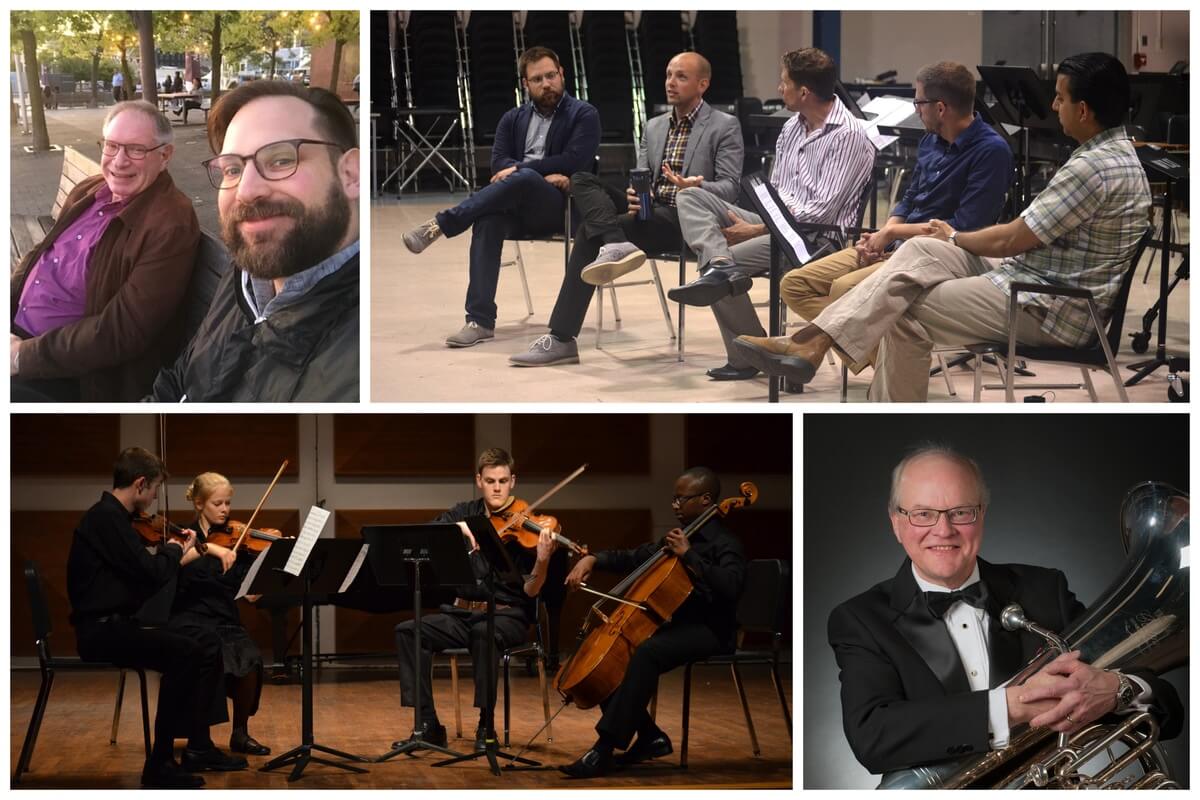
Through last 60 years’ programming, NYO Canada has touched many lives, and about a third of current Canadian professional orchestral players are NYO Canada alums. How did NYO Canada impact the individual lives? Each of these experiences is so personal and amazing, especially for Frank Morphy and Ed Tait — it was not only a chance for refinement, but a total and complete revelation.
Frank and Daniel Morphy
Frank Morphy joined NYO Canada in its very first year, 1960. Having started on trombone in grade 9, Frank switched out to oboe on his teacher’s request. “My music teacher asked me if I would try the oboe — I really did not know what it was, but I said yes, as long as I could go back… when I wanted to go back to trombone, he said no, and instead, he found a teacher for me.” After a year or so of lessons, Frank’s oboe teacher left the RCAF band. “Then I was pretty much left on my own, and self-taught. I did buy some records, and did a lot of listening,” says Frank.
Frank cannot remember how he heard about the Christmas 1960 NYO Session. “I don’t remember any audition. I arrived to find six of us, and I was in awe of them all — they all played so much better than me… it was a huge orchestra, with six players in each wind section.”
By the 1964 session, Frank was still without a teacher, but through NYO, he met Perry Bauman playing with the Toronto Symphony Orchestra, and he started to travel once a month from Ottawa to study with him. For the 1964-66 sessions, he remembers staying at Burwash Hall, Victoria College, University of Toronto, and playing under the batons of Walter Susskind, Franz Paul Dekker, Victor Feldbrill and John Avison. “NYO game me an appreciation of orchestra playing, and the beginning of what might be involved,” says Frank.
Once Frank graduated from University of Toronto, he played a few years with the National Ballet Orchestra, then won his position with the Toronto Symphony in 1972 until he retired in 2011. And Daniel, his son, grew up watching Frank play with TSO as a child.
It was a very proud moment for the family when junior made it to the orchestra 46 years later. “I’ve looked up to my dad a lot, especially when I started preparing for university and decided that I wanted to be a professional musician,” says Dan. “I wanted to do the same things he did, so I was getting the same type of training he did. I was just excited that I got into NYO and that I was able to do the same thing he did when he was my age.”
Dan’s first instrument was piano, but soon, he wanted to be a drummer in a band. So he joined the school band in grade 5 to sit on a drum kit. The kit lessons then expanded in exploring the wide world of percussion, and when he was 17, Dan started to study with John Rudolph (current NYO Canada faculty), and in 2006, Dan was accepted to NYO Canada on his second application — he remembers that there was definitely a Bach transcription on the audition material.
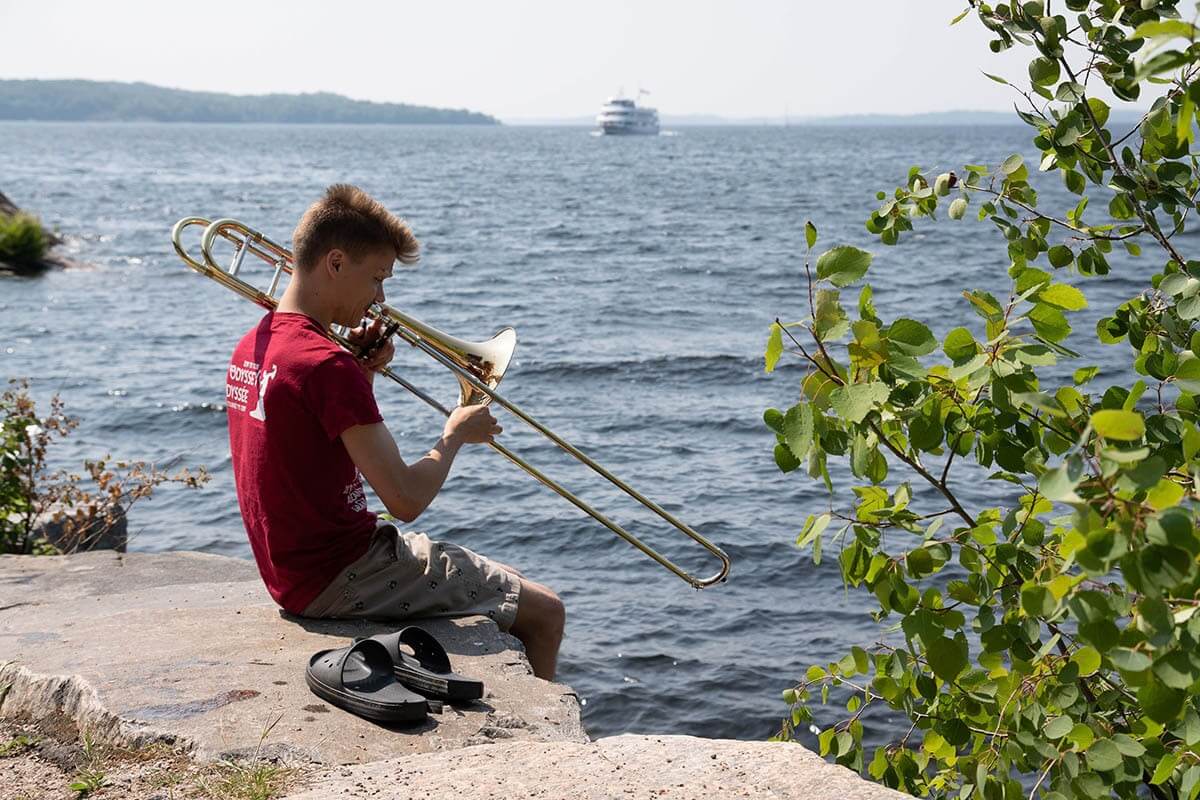
“My summer at NYO was incredible,” says Dan. The training base was in Montreal that year, and Dan cherished the chance to live and experience one of his favourite cities to date. “Building a wall of coffee cups in the percussion section, staying all night out by the fire pit at the Fairmont Le Manoir Richelieu during a tour stop… some of my closest friends I made during that time, and those I may have met before, strengthened my relationship with them for sure,” says Dan.
Dan had a quite a good performance story as well.
“We were playing Don Quixote, and in this particular variation Don Quixote and his sidekick Sancho are “flying” through the air on a magical horse, blindfolded. The music to me also sounds very storm like (it helps there is also a wind machine, along with rushes of strings and winds) and it just so happened that there was also a lightning storm happening right outside the theatre. Precisely when we arrived at that part in the music, all the lights in the theatre went out, but everyone kept playing! throughout the minute-long sequence, the lights flickered once or twice, just long enough to see your music and also to see our conductor, Jaque Lacombe, conducting bigger and bigger (as if we could see him in the dark). When the section came to a close, the lights came back on and we finished the piece. No one got lost, no one stopped playing. we had actually played it from memory…in the dark. You can’t make that up.”
Having attended NYO Canada at age 21, learning to deal with several different personalities and tendencies, and owning up to the responsibility as a section, has been a valuable experience for Dan.
Gregory and Adrian Irvine
Gregory grew up in Middleton, Nova Scotia, and began to play music through his school program. “We started with recorders in the beginning of the year, then by Christmas, we were given instruments”. He was given a baritone in grade 6. his high school — one of the two well-established band programs in Nova Scotia at the time — got brand new euphoniums and Gregory really wanted to play the new shiny instrument. However, when he asked the teacher if he could play something ‘larger,’ alas, it was the tuba that was given to him. However, he quickly fell in love with the deep sound of tuba, and when he went to his first music camp in Mount Allison University at age 13, Gregory was truly hooked.
Gregory first heard about NYOC from an older student who was preparing for his NYO Canada audition on French horn. Back then, with no internet, there wasn’t an easy way to find out about NYO Canada, but he knew that it would be quite challenging as a tuba player. “There’s only one position, I knew it was hard. I wasn’t expecting to get in on my first year (at age 15). I just kept auditioning.”
In his time, the auditions were done through live recording. “Each year, the viola coach — Steve Kondacs, did a tour around the country, listening to, and recording auditions in various cities — mostly provincial capitals except when distances were too great. I auditioned in Halifax in a CBC Radio studio.”
The news came eventually. “I remember when I was 19, I had a summer job, pulling tree seedlings and putting them into buckets at a tree farm. We worked in all-weather conditions. And on the last day, unexpectedly, they gave us the pink slips.” Working for minimum wage, and now dismissed, Gregory felt quite low on his way home that day; however, when he got home, NYO Canada called him with news of acceptance and “… that saved me,” laughed Gregory.
His first year with NYO Canada was life-changing yet also quite intimidating. “Being from the Maritimes, I had a bit of an inferiority complex — typical at the time for Maritimers — and wondered if they had made a mistake! But I thrived, and was so inspired by great players and instructors,” says Gregory.
For the 1976 session in Quebec City, Gregory took an overnight train, “By then, I had a hard case made for band trips. It was a plywood box, made with 1/4-inch and lined with styrofoam. It was incredibly heavy, but at least it had wheels on it. I remember taking everything I owned — NYO Canada asked us to pack tux with bow tie, and I had a second-hand tux that I got from my band director — it was from 1940, it wasn’t in the style, but I took it.”
As a 19-year old, Gregory and age-appropriate friends frequently hung at the bar just outside of the residence. And he remembers lots of soccer playing and great conversations. In fact, it’s the summer conversations that led him to his next pursuit in brass pedagogy in the United States, studying with Arnold Jacobs and Rex Martin. Gregory returned to NYO Canada multiple times, and as a professional, he went on to play with the Hamilton Philharmonic Orchestra for 11 years, and then joined faculty at the University of Prince Edward Island in 1990. He just recently retired last year after teaching there for 29 years. For NYO Canada, he served as staff member for 12 years (1979-1991), and is currently on the board of directors.
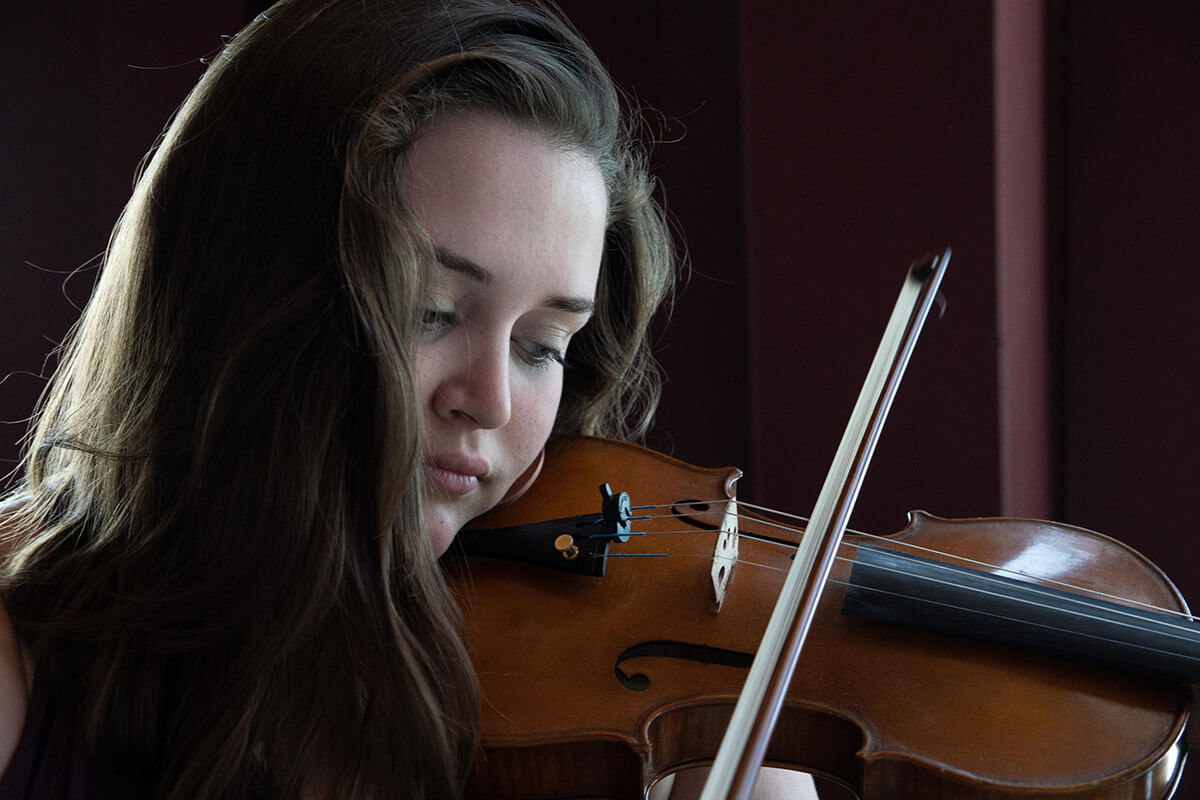
Adrian started on violin at age 3 (his mom is a violinist, and Adrian wanted to be like the older ‘cool kids’ that she taught at home). On one unsuspecting afternoon, Adrian was given a full-on NYO Canada application pitch on his way back home from a lesson. “Dad would drive me to lessons in Halifax once a month, and at the time, NYO Canada’s age limit started at age 16. My birthday is in July, so I was 15 when this happened.” He wasn’t keen at the beginning, but Adrian decided to apply. His first application was recorded by proctor — his dad, at University of PEI. “I don’t know if it was more or less nerve-wrecking to have my dad as proctor,” Adrian laughs. Adrian’s acceptance for NYO Canada was a proud moment for Gregory, and Adrian went on to return two more times.
In his first year, Adrian and bunch of 16-year olds were extra violins — they didn’t get a placement in traditional string quartets for chamber sessions. Instead, they were given a unique opportunity to explore Bartok duets, Telemann works for 4 violins, and Steve Reich’s Violin Phase. “Greg Oh approached us for the Violin Phase — at this point, I haven’t really experienced or played Reich, so it was a totally new experience. We played the 4-person version and the amount of focus shifting required for phase shifting, entry points, and walking across the stage to get to the ‘right’ score — all this was a total mind bender,” says Adrian. And Adrian consider this as a pivotal point where he got more interested in extended techniques with technology and composition.
Along with his lifelong friends met in NYO Canada, Adrian considers NYO Canada as one of the core experiences that has shaped him into the musician he is today.
“I was 16 in my first summer with the NYOC and was just about to enter my final year of high school. It was perfect timing for me to see so many dedicated young musicians at various stages of education and careers. There were people just starting their undergrads, people already auditioning for professional orchestras, and everything in between. It was incredibly eye opening to see what was involved at every stage and definitely made a future in orchestral playing feel more tangible.”
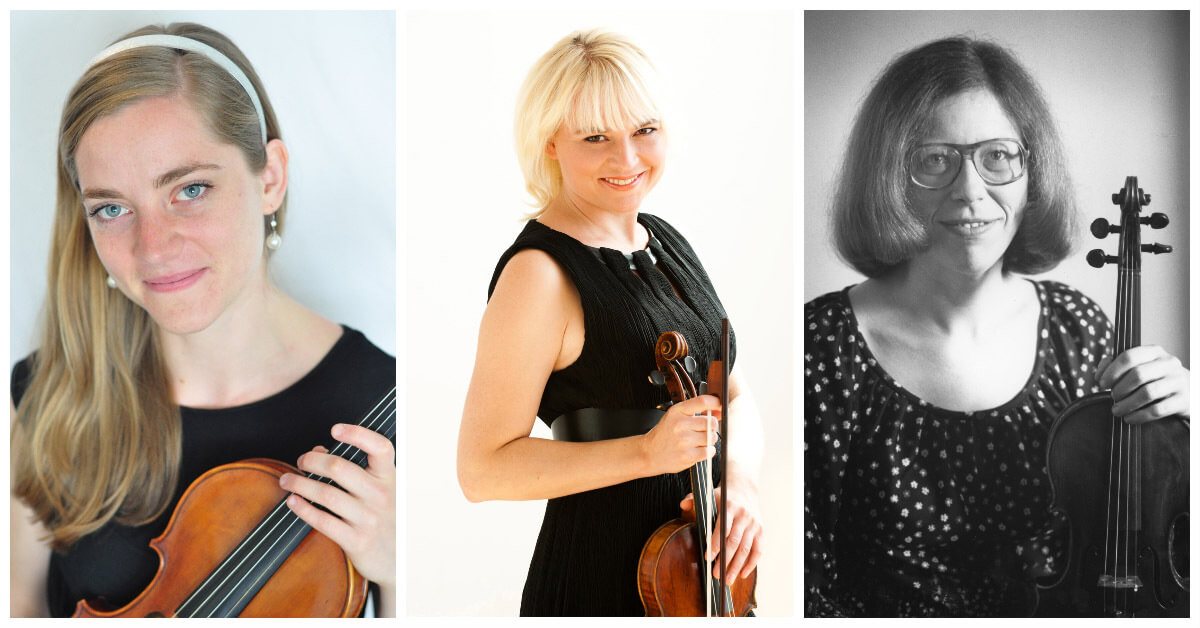
The Wiebe Family – Peter, Sarah, Evan and Kathryn
With choral conducting dad and pianist/composer mother, Peter Wiebe grew up with music in the house. Initially starting on the violin, Peter fell in love with the cello at age 9, listening to Beethoven’s 5th Symphony, second movement, and switched instrument.
“I started to audition for NYO Canada in 1980, and made it for 1982,” says Peter. For the auditions, Peter remember going to someone’s house, where NYO Canada had arranged for a recording session, and doing a paper-based application. For those early days, Peter remembers NYO doing smaller tours, mostly on buses, playing at local school gyms and town halls. Citing Death and Transfiguration in a Vancouver concert under the baton of Kazuyoshi Akiyama as one of the most memorable moments, Peter took a job at the Windsor Symphony as core member in 1987. He has also been busy on the podium as the associate conductor of the WS, and only recently has stepped down from conducting the Windsor Youth Orchestra.
With his wife, Ruth Wieber, they have six children, and three of them — Sarah, Evan and Kathryn — have participated in NYO Canada. Sarah started violin and piano at age 5 at home. Though she enjoyed chamber music and orchestral playing through the violin, she always preferred the piano, and it wasn’t until grade 12 that she decided to apply for a university music program.
For her first application, Sarah travelled to Western University to do a proctor-run audition recording. Sarah remembers prepping excerpts from Der Heldenleben, Mahler 1 and Prokofiev’s Scythian Suite for the 2008 audition. When NYO Canada started to experiment with its chamber music program in 2009, Sarah was placed in a string quartet. “Unlike now, just a few students were enrolled in chamber music, so the schedule was quite crazy — we worked on the Haydn Sunrise String Quartet,” Sarah says.
“I used to do lots of things that Sarah did, and it would be a musically awesome experience — and it is free!” Evan says. With strong encouragement from parents and his older sister, Evan decided to apply for NYO Canada. Starting on the violin at age 5, Evan was asked to switch to cello, as there were ‘too many violins in the family (the other two boys, John and Andrew plays viola).’
The 2009 program included Stravinsky’s Rite of Spring with Alan Trudel — and this is Evan’s most memorable repertoire of the session; he also remembers many games of ultimate Frisbee and card games. Evan and Sarah also remembered that this was the first year of NYO Canada’s online streaming performance, and the recording session at McGill — and seeing the technical studio production side of it was another highlight for Evan (he now works for voices.com, one of the largest voice-over production companies). This particular recording, featuring Mahler’s 6th and the Rite, was nominated for the 2010 Junos.
Kathryn Wiebe remembers her 2010 audition as being quite tough. As part of the 50th anniversary, NYO Canada invited past alumni to rejoin the orchestra on stage. However, the perk of a big orchestra meant that Kathryn got to play extra lush programs — in fact, two programs, including Don Juan, Scheherazade, La Valse and Petrushka. In the 2011 tour, ‘Strike A Chord’, Kathryn vividly remembers Mahler 5 and Der Rosenkavalier as highlights. “I’m so glad to have experienced NYO Canada — it shaped me a lot and I confirmed my own passion for orchestral playing,” says Kathryn.
“One thing that I have come to value most in my work as a musician is the community that is built among my colleagues. From the good friends I made at NYO and school to those I have met on gigs, going to work often feels like a reunion of people that I enjoy being around and who inspire me both musically and in their personal lives. It is also extra special to show up to work and see one of my family members there; often there are hugs on stage and looks shared across the orchestra when we get to a part we both really enjoy playing. I am so grateful that my immediate family also gets to be part of my music family and vice-versa. It is one of the great joys of life!” adds Sarah.
Julia Wedman
“My dad was from a big family — 12 kids, and they all played something, and he thought it was very important that all kids get the chance to learn an instrument,” says Julia. Starting violin lessons at age 4, Julia first applied to NYO as a high school student from Saskatoon, where she was the concertmaster of the local youth orchestra. “I probably sent a cassette tape.”
Though she didn’t know much about the program when she initially applied, Julia’s participation in training orchestra (she later attended the World Youth Orchestra and the Schleswig-Holstein Music Festival Orchestra in Germany), allowed her to see the world. “One year, we took a 30-hour train ride from Vancouver to Toronto; it felt interminable at the time,” she remembers.
Along with intense professional training, Julia also got to experience the richness that orchestral life can bring — including the late night parties. “I loved getting the chance to hang out with wonderful musicians all day and night. I especially loved the late night jam sessions where people would just play together or for each other. There was something magical about that time of the day — people were relaxed and just happy to share music with each other,” says Julia. Her other highlights include coaching with Gwen Thompson, and making lifelong connections, including meeting cellist Felix Deak for the first time on a tour bus.
“You also learn how to deal with homesickness, you learn how to be resilient and overcome challenges, and you learn to find a place for yourself in the midst of this group of fantastic musicians, especially for people coming from smaller places. It is an invaluable experience.”
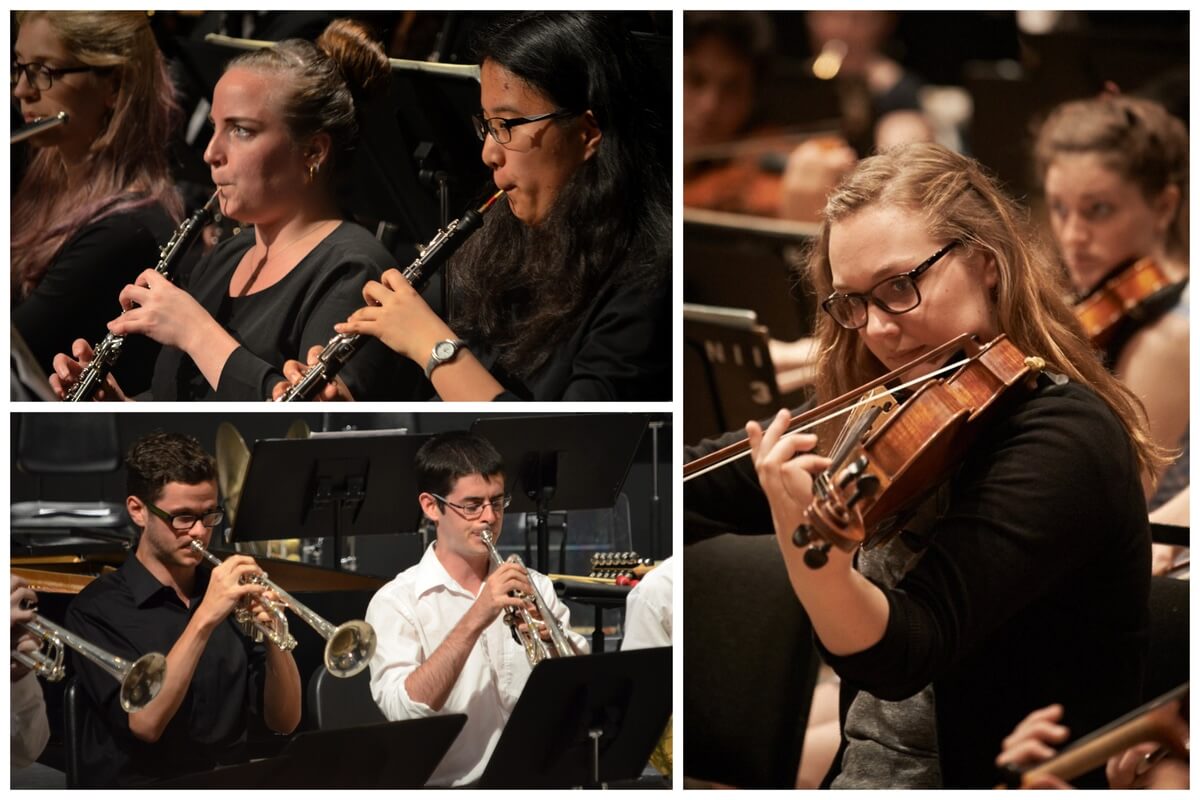
Matthew Ross
“One of my friends in middle school played the trumpet and I thought it was fun,” says Matthew. And ever since then, he’s been trying to figure the trumpet out. When Matthew left Bermuda to start university in 2009 at the Faculty of Music, University of Toronto, his teacher, Anita McAlister, encouraged him to audition for NYO Canada.
“I believe my first audition was at the University of Western Ontario — and it did not go that well… I procrastinated a lot during my first year of university, so I left my preparation that year to the real last minute. It wasn’t until my third year where I started to organize my time better, and I was waitlisted for 2012 session.” Then for 2013 session, the first year NYO started to accept video applications, Matthew took his take wearing baggy jeans and no shoes on the very last day before the deadline, and finally made it into his first NYO Canada session.
For the 2013 session, Matthew’s favourite was Mahler 9 with Alan Trudel conducting, and he immensely enjoyed the chamber music institute. “I remember playing in brass quintet for two weeks and it was incredible. It is really hard to schedule rehearsals for chamber groups at university, so this was the first time for me, where everyone was on the exact same schedule and we were able to rehearse and get coached every day… the schedule was busy, but manageable. On a normal day, we would have a rehearsal or a coaching from 10-12.30 p.m,, and another from 2-4.30 p.m.… the brass faculty were very generous with their time and were so supportive to all of us.”
in 2015, Canadian National Brass project had an NYO residency, and them performing O Magnum Mysterium was another memorable moment, as well as the overnight train journey from Montreal to Halifax in 2017. However, the best thing for Matthew in 2017 session was re-grounding. “I had a really tough year during the first year of my Master’s degree, and lost a lot of confidence. However, NYO Canada is a really positive environment for making music, something I really appreciate — the 2017 program helped me to have fun playing again.”
And for the 2019 session, Matthew’s request to focus on second trumpet parts was accepted, which gave him a great preparation for his contract with the Calgary Philharmonic Orchestra. “For NYO trumpets, you rotate parts so everyone gets a chance to play different roles in the section. However, for 2019, I requested to play mostly 2nd trumpet for the tour, as I was starting a one-year contract with the Calgary Philharmonic Orchestra. It really helped me.” Having several alumni in the CPO, including Alisa Klebanov (2015,2016. Violin), who attended NYO Canada 2015 with Matthew, is another joyful connection at his work.
Carolyn Farnand
“I remember people kept slamming the main door to the residence building and thus ruining every recording — eventually I had a couple of quiet minutes and managed to get a decent take,” Carolyn remembers. However, all those efforts were worth it, as that was the take that allowed Carolyn to experience NYO Canada.
As a shy person, Carolyn appreciated the first two weeks of chamber music institute, as it allowed people to get to know a small group, then to build a larger connection with others once the orchestral training started. Carolyn found NYO Canada’s workshops, especially on hearing loss prevention, injury prevention and studying abroad, quite memorable and practical. “NYO also provides each musician with high-quality earplugs from the Musicians’ Clinic, which I still use to this day.”
The 2016 Portugal tour was a particular highlight for Carolyn, musically and personally. “We got to travel and play in so many gorgeous venues! And my partner is a musician that I met from NYO! In 2016, the orchestra had toured to Portugal and we had access to a high school there to practice in. My partner and I ended up practising at the same time, every day, and thus running into each other continuously.” A few years later, when Carolyn wanted to collaborate with a clarinetist a few years later, she immediately reached out to him. They continue to perform together in various chamber ensembles and orchestral settings.
These personal and professional connections through NYO Canada are very common among alums, so when Carolyn showed up at her first day at the Canadian Opera Company Orchestra Academy she was met with a familiar face — the current tuba faculty, Sasha Johnson (1993,1996 alum), and also when she was greeted by an NYO friend, Richard Zheng (2016, Violin) upon her arrival to Schleswig-Holstein Orchestra. These things continue to make her NYO Canada experience stay alive.
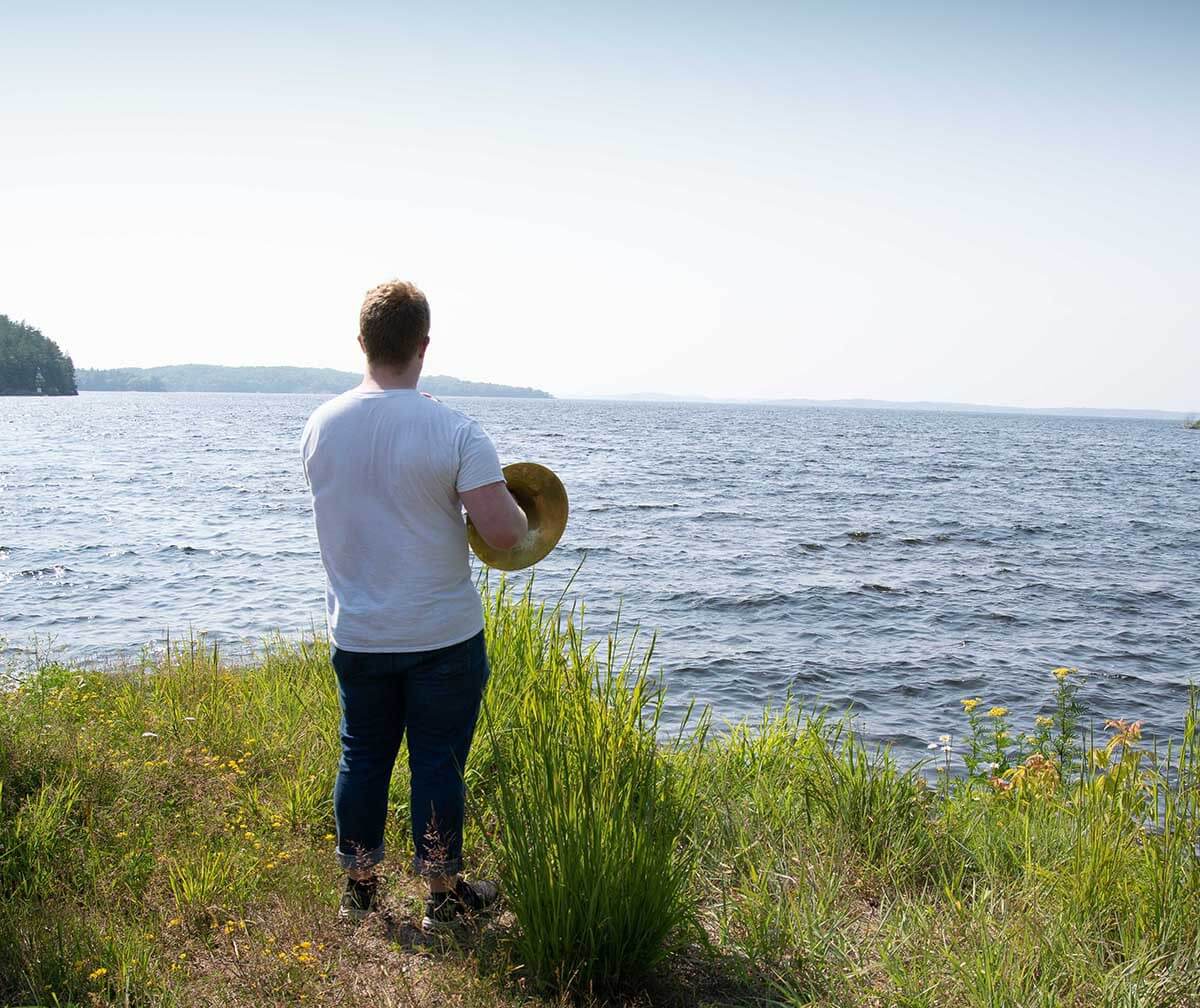
Kira Shiner
After learning the piano for 7 years, Kira chose the oboe in Grade 7 band. “Band was mandatory, and I knew that I did not want to play the flute, because every girl in my class wanted to play it.” When it came to pick instruments, Kira briefly mused on French horn. “I knew that was supposed to be hard,” she remembers. But, she was convinced that the oboe must be interesting. Being the ‘only one’ in a small town was refreshing to Kira. “I was really the only young, serious oboist in town.” With lessons and a youth symphony program, Kira decided to pursue a career in music.
Kira applied to NYO Canada in 2015 as she was graduating from high school. But it was in 2016 that she started to look into it seriously, as she came to Toronto to study with Sarah Jeffrey (1996, 1997, 1998 alum and current faculty). “Sarah encourages her students to attend at least one summer program during the long summer vacation, and she suggested that I apply to NYO Canada and she supported the process, to make sure I went about it the right way.”
Working on excerpts in lessons, making recordings at least a week before the final due date for last feedback from her teacher, and prepping to make a ‘good’ reed, Kira has auditioned five times in total, and she notes that some excerpts were perennial favourites. La Scala di Seta (Rossini) and Le Tombeau de Couperin (Ravel).
Getting a good recording device and finding a good space to record also posed its own challenge. There were plenty of late nights. “My 2017 audition video was taken at 1:15 a.m. It was me and a friend. It was 1 a.m., and he wanted to do one more take. I was exhausted but I thought, why not, I will do one more — that turned out to be the best one, which got me in,” Kira chuckles.
The 2017 tour, Edges of Canada, took Kira to 13 different Canadian cities, with a camera crew in tow the whole time. “I remember being very stressed — I was having a major case of imposter syndrome during my first year at NYO Canada. I had never been in such an intense training situation, so that, plus having to meet all the new people (I am an introvert), was quite overwhelming.” But she found her people, and it truly became a once-in-a-lifetime experience for her.
“The entire tour was a dream come true in lot of ways. It will always be a highlight of my life as it was the first time I got to perform in real concert halls such as Koerner Hall, Maison Symphonique, National Arts Center, etc. Also getting up early with friends to watch the sunrise in the middle of nowhere New Brunswick on the overnight VIA train from Montreal to Halifax… taking the charter plane to get to Whitehourse… and my parents attending our last concert in Vancouver. They were extremely proud and excited for me to attend NYO Canada, and at the performance, they were impressed at the level of playing in the orchestra. It was one of the moments where they fully understood why I was studying music and what I was working towards. Since I was studying in Toronto and they are in Kelowna, they didn’t get to see me perform a lot, so seeing that NYO Canada performance meant a lot to them.”
The best thing about NYO Canada: “It’s just you, the music and the people you are sharing that with,” Kira says. In fact, Kira is happy to send, “A shout out to my now partner, Taran Plamondon — he was a constant supporter during my years in NYO and I’m happy to say he’s now a constant supporter in my life.”(Taran is 2016, 17,18 French Horn alum). Kira’s life has NYO Canada embedded in it deeply, and it’ll always remain special.
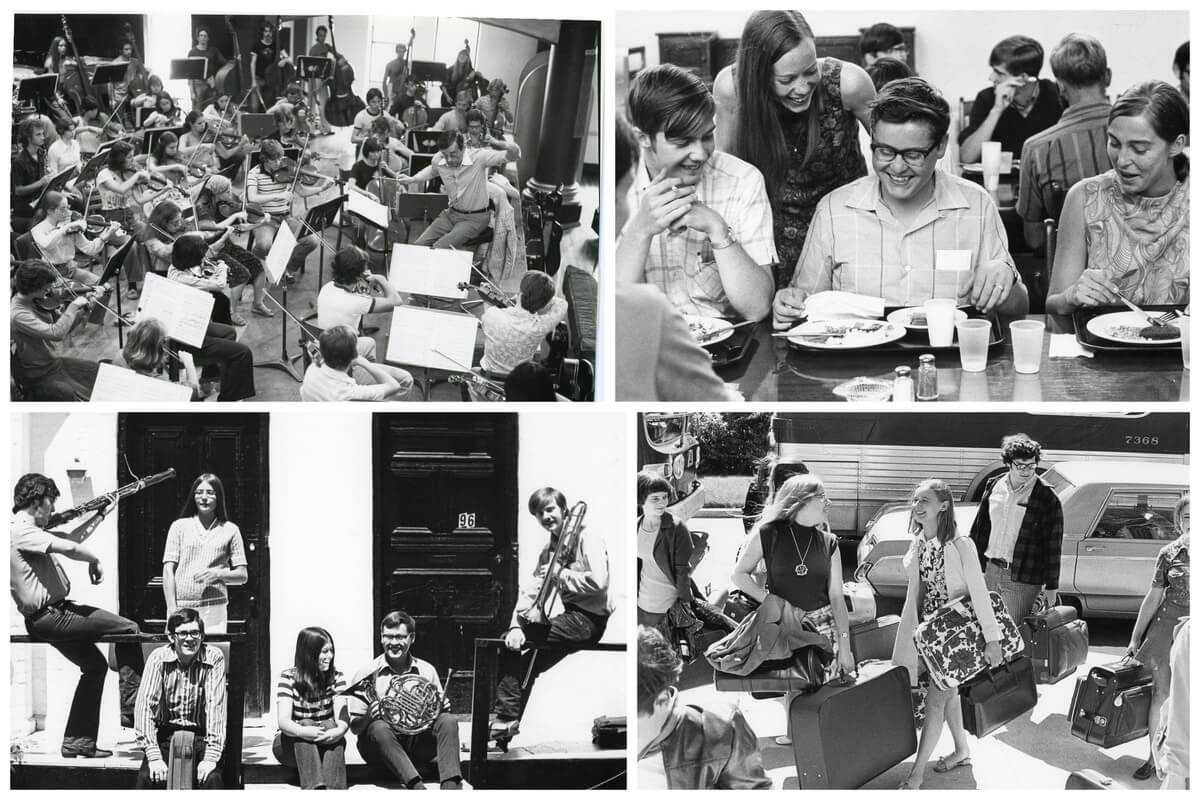
Jacob Valcheff
“I first started guitar in the fifth grade, and I wanted to be in a rock band,” says Jacob. But since guitar wasn’t a band instrument, it was suggested that he should try percussion. So during summer after grade 8, Jacob took some drum lessons and started band percussion in 9th grade. First hearing about NYO Canada in grade 11, it took Jacob a bit of time to carve out sufficient time to prepare for the audition. In the fall of 2017, Jacob started to work on his audition repertoire as a second year undergrad at the Faculty of Music, University of Toronto. “The format was video recording, and I started my preparation the day the excerpts came out in October 2017, and finished my recordings four days before the last deadline, which was February 1, 2018.”
On the morning of February 26, 2018, Jacob got a text from a friend who said the results were coming out. “I then went through my morning routine, and as I left for school, I got the email on my phone. I was expecting a rejection — being only a second year music student at the time, I knew the competition was high and I knew that so many strong musicians had auditioned, but I was incredibly surprised when the email opened with ‘congratulations!’. I was ecstatic. I immediately called my family.”
During the chamber music institute of 2018, Jacob and friends studied Steve Reich’s Drumming, and coach Aiyun Huang called in Russell Hartenberger, who taught them by rote. “Russell was a member of the original Steve Reich and musicians ensemble, and they premiered Drumming in 1971, so it was incredible to learn from his expertise.”
The 2018 Migrations Tour brought NYO Canada to European tour stops at Berlin, Kassel and Edinburgh. However, the most memorable moment for Jacob was right at his hometown. “I remember playing Ein Heldenleben in Toronto. Leading up to a huge climactic moment, I looked out into the audience at Koerner Hall. I saw my current percussion teacher, my previous private teacher, and my parents in the audience. I remember thinking of how fortunate I was to be making such incredible music with such incredible people in such a beautiful hall. This really was magical, and I knew then that I wanted to do this for the rest of my life.”
Jacob has been accepted for 2020 session and was really looking forward to it, as he would’ve known a lot of the orchestra, which makes a huge difference for musicians.
“What was beautiful about the 2018 section was that I got to experience the development of these connections with people I did not know, and I got to see these connections grow over the course of the institute. I was really excited to connect and grow even closer to the friends I was going to be with, in 2020. Although I was sad to hear about the cancellation, it definitely needed to happen in the interest of health and wellness. It was a tough decision I am sure, but it was the right one. I look forward to seeing all my friends and colleagues, and making music with them in the 2021 iteration of NYO Canada.”
Lucy Nesbitt
“Studying with Gabe Radford for the first three years of my undergrad meant that, since he was NYO Faculty, he sort of made all of us in the studio work up the list and send a video every year,” says Lucy. Working on the excerpts from the day the reps are announced till the deadline on 01 February — it’s a tough process, balancing everyday life, school work and to prep for a great audition. “… The videos, when you are allowed to call the shots on how many takes you’re allowed to do, it gets very easy to try to do it a million times until it’s perfect — which can be draining,” says Lucy.
As she was waitlisted, Lucy had to be patient. “The news came through the grapevine at first, and so when I finally got the email, it was so exciting — such a relief. I’d auditioned for the past three years and made the waitlist the year before, so it felt like a long time in the works.”
However, it wasn’t so easy. The participants often cite worrying about underperformance and failure, and Lucy ended up breaking down in tears one day. “I was so worried that I couldn’t play well enough to match the section. I remember going to Gabe and asking him. how do I match tone colour? How do I find the intonation of the entire orchestra? How do I watch the concertmaster to stay in time? And he just sort of laughed and said, ‘Just listen and blend.’ It was all just so new and terrifying but I felt myself figuring everything out better and better every day.”
The 2019 Odyssey Tour was definitely the best part for Lucy. “It was the best thing that has happened. The entire Canadian tour was perfect. Every concert was an adventure, and just so alive. These performances were the first time I understood how connected an orchestra can and should be. Every single person there was giving their all, every time, and after the shows we were always all so pumped up, no matter how tired we were. I don’t remember anyone complaining about the schedule once, or really anyone getting to overwhelmed. It was such a fantastic group of people; I can’t even begin to explain.”
The gruelling recording session in Montreal, and performing in Spain, including the final performance at the Alhambra palace, with a birthday stuck between the last three free days before returning to Canada so that Lucy and boyfriend, Ryan Garbett (2014, 2015, 2019 Horn Alum) could explore together, Lucy considers the 2019 session as one of the best things that she’s ever experienced. “Every night, we’d get a standing ovation, the audiences were so good to us. And playing in Alhambra — by this point, I felt that the orchestra was completely unified.”
“NYO Canada helped me to come out of my shell. Music tends to do that to a person, because it pushes you out of your comfort zone every day.”
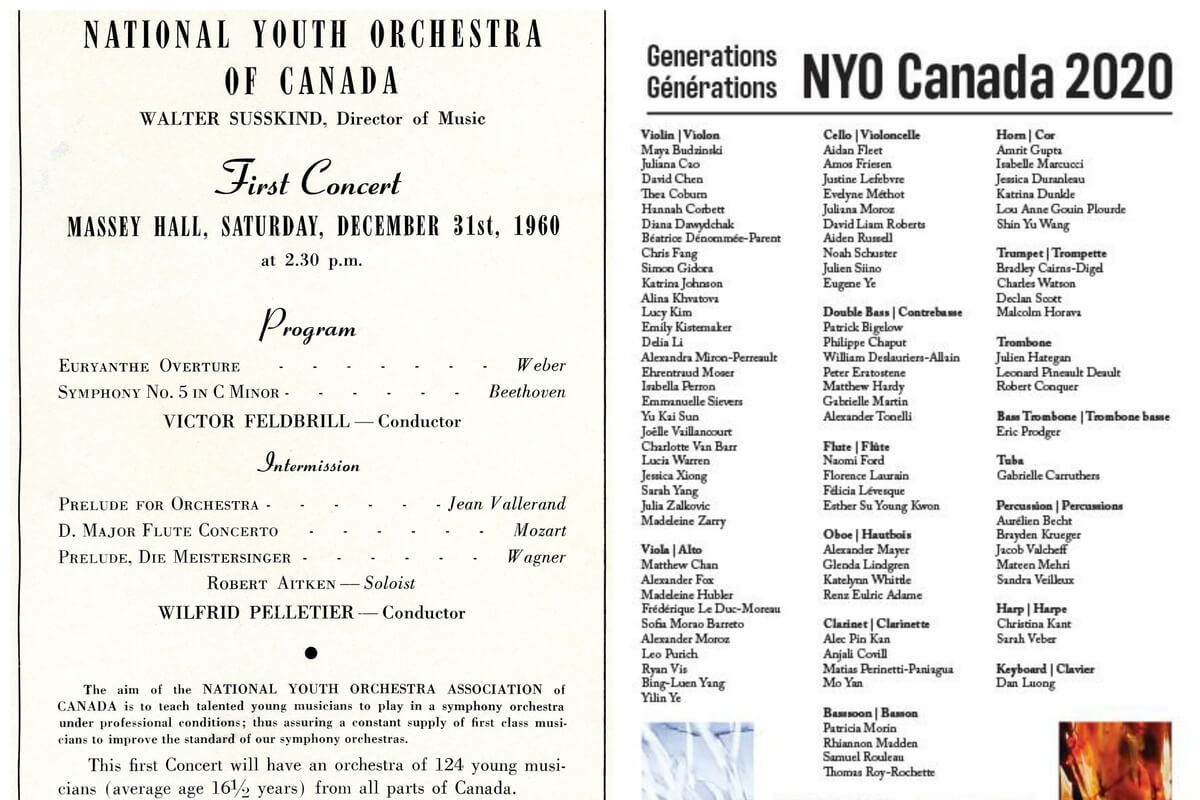
Ryan Scott – Percussion Faculty
Since 2013, Ryan has been working as percussion faculty for NYO Canada, and he is keenly aware of the possible influence and experience available to young musicians through the program. “The NYO Canada is in many ways the first stepping stone into the professional community outside of a formal education at a university or conservatory. It is an enormously important way for top early-career performers to connect with established professionals and to their emerging colleagues. The relationships developed at the NYOC last for decades and lifetimes,” says Ryan.
During the chamber music institute, Ryan tries to focus the students on how to play with other people. Considering it a learned/learnable skill, the communication through body language, whether within a section, or with a conductor, is essential musicianship. Other topics, including how to practice, and developing general musicianship and etiquette, are also of interest to Ryan, as he also learns constantly from fellow faculty members. “Well, it’s not just how you play and every professional knows that,” says Ryan. “It takes a lot of character, endurance, stamina, discipline, professional courtesy, well-measured humour, warmth, compassion, reliability — you name it. The faculty demonstrates this on a daily basis and expects to see these qualities resonate in the students.”
For Ryan, the most rewarding aspect has been to connect to the next generation of outstanding Canadian percussionists, so with the 2020 cancellation, he is interested in staying connected to the new crop of 2020 percussion players through a new layer, continuing to find a way to stay engaged and teach/learn online. Once the NYO Canada goes online for the summer session, both participants and audiences will have the chance to explore this rather new context.
Ed Tait – Double Bass to Double Bass Faculty
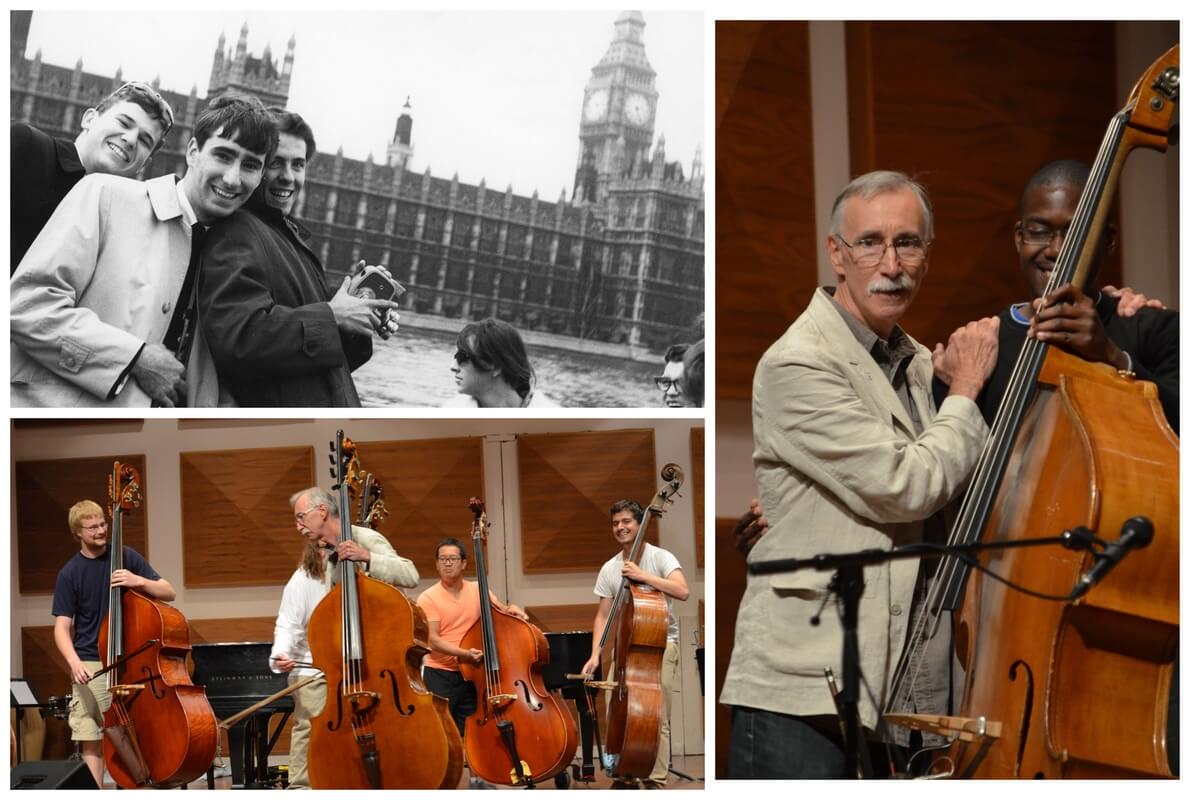
“Without the Canadian National Youth Orchestra I would never have become a bass player,” says Ed Tait. Ed wanted piano lessons at age 4, but it just wasn’t possible for his family, so instead, he sang at the local church choir. At his high school, he finally got his hands on a violin. After a year, Ed was asked to switch instrument by a bass player; he agreed and spent the next four years holding up a double bass. “No lessons… I did not know how to play a C major scale when I left high school,” laughs Ed.
As a teenager, Ed took drum lessons. “I studied privately with a studio drummer for four years, and I was fairly a proficient rock’n’roll Dixieland drummer,” he says. He also prepared for the grade 6 piano certificate to be accepted into the music education program at the Faculty of Music, University of Toronto. Ed was accepted as, “The possibly the worst piano major in the history of the Faculty.” He finally had to choose his major.
“Well, one of my friends told me that I should choose the bass because there were no really good bass players in Toronto, so I would get a lot of jobs,” says Ed. The friend’s uncle was a bass player, and agreed to take Ed as a student the following year. “He also suggested that I carry a Toronto phone book around for a while every day, gripping the binding side with my left hand. I bought a $200 plywood bass and took it with me to my summer job as a drummer in a hotel dance band,” says Ed.
Ed got to serious work in September of his second year in university but realized that his teacher, a dance band bassist who had never played in a symphony, was not able to give Ed the knowledge he wanted. “This is where the NYO Canada comes in,” says Ed.
“All of my university friends were members of the NYO. They were all pushing me get into that orchestra.” For the coming summer, Ed applied to NYO Canada (bass) and Fort Henry Guard Band (drums) and was accepted for both. “How the devil, I cannot imagine. It must have been slim pickings for the audition panel for the last position of their bass section,” chuckles Ed.
The legendary Frederick Zimmerman, Assistant Principal Bass of the New York Philharmonic was the coach that year, and under his patient, methodical and encouraging teaching, Ed kept swimming in the deep water, up to 14 hours a day. “How to hold the bow, how to shape the left hand, fingering patterns that improved intonation…”
This became Ed’s life. “During the school year I worked with my Toronto teacher. I played in a string orchestra and the symphony orchestra at the RCM, and I played in in dance and jazz bands as a drummer. The NYO was where I really did my most important work,” says Ed.
The 1966 NYO Tour included England, Scotland, France and a concert in Berlin, and Ed studied with Robert Rohe, then the principal bass of the New Orleans Philharmonic symphony. Still in his third year of serious bass training, Ed was still hard at work, when an unexpected offer came. “At the end of the session, just before we headed out on that tour, Robert approached our principal bassist, my jazz buddy. He told us that his bass section in New Orleans was perennially short three players,” says Ed.
The two young bassists couldn’t take the offer — they had professional positions already. “He then turned to me and asked if I would be interested. I took a brief moment and I said, ‘Uh well… Yes!’”
In New Orleans, Ed met a section consisting of old pros and young graduates, playing major serious symphonic works, and it was the NYO Canada experience that saved him. “Nearly every major symphonic work that was programmed for the 1966/67 season of the New Orleans Philharmonic Orchestra was something that I had played in the NYO. I was in familiar territory,” he recalls.
Then came the draft notice came, and he had to leave New Orleans. In the summer of 1967, after returning home, Ed joined NYO Canada as student for the last time, and met Tom Monohan, then the new principal bass of the TSO. Ed was chosen to lead the NYO Canada bass section through the Western Canada tour, and after that summer, Ed continued to study alongside his classical bass freelance work, for two years before joining the National Arts Centre Orchestra in 1968. The rest is history. in 1970, he joined the TSO as Tom Monohan’s stand partner for 22 years. “The NYO played a huge part in my success in finding my way into a leading Canadian orchestra. Six years after I got serious about playing the instrument, I had achieved my goal,” says Ed.
Ed served as faculty member from 2004 to 2013, He considers it a great honour, and beautiful bookends for his career. Without NYO Canada, where would Ed be today? For him, that’s unimaginable — he would not change anything in his life, and Ed appreciates NYO Canada’s pivotal role in every step of his journey.
The 2020 Session That Wasn’t
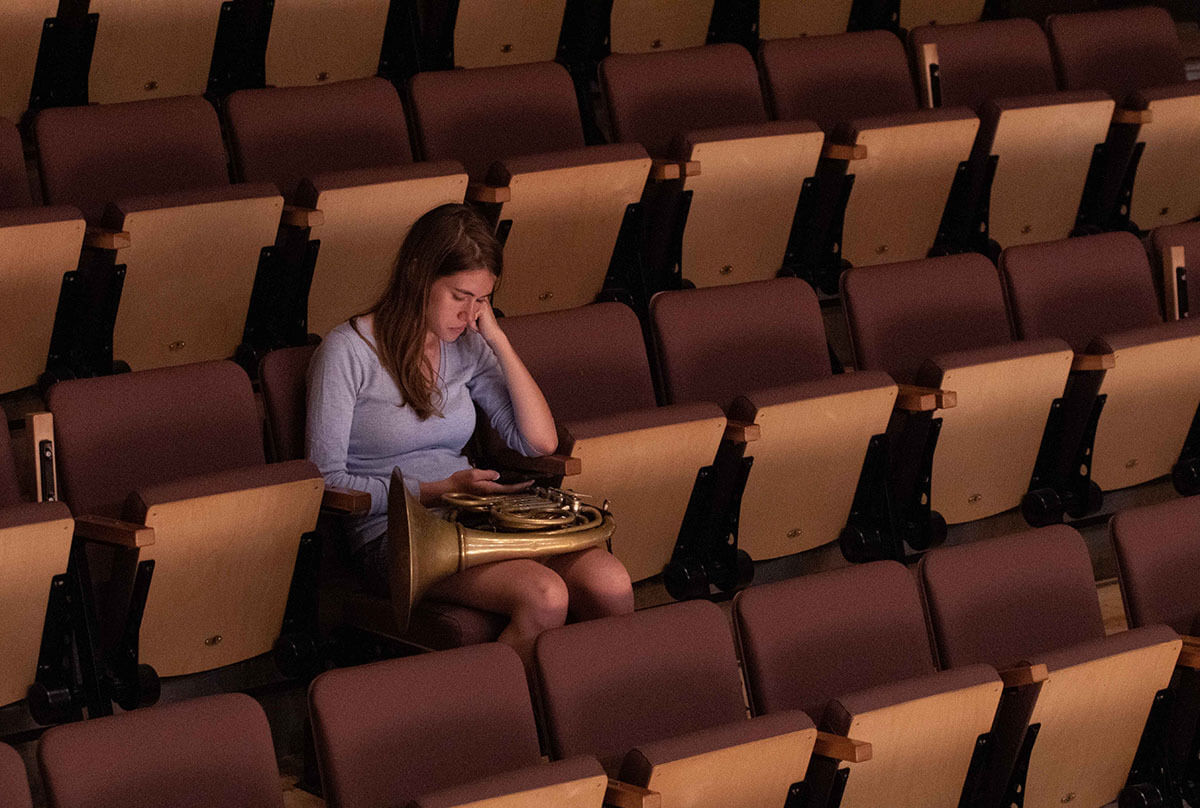
Initially scheduled for five weeks of summer training (starting with a two-week intensive chamber program, NYO Canada Chamberfest, and the three-week Orchestral Institute under the baton of Michael Francis), followed by a three-week Generations Tour with European stops in Germany and Croatia, to celebrate NYOC’s 60th year, the NYOC 2020 session is now cancelled due to the COVID-19 pandemic. In lieu of the cancellation, NYOC is working to adapt, including offering the first right of refusal for 2020 members without having to reaudition for the 2021 session. They are also working toward a reduced program for late fall or early winter 2020, as well as building an online program for the summer.
These changes demand quick adaptation from all involved, including various levels of donors and supporters. The organization explained its position in a media release.
“NYO Canada are extraordinarily grateful to our donors for their steadfast support at this time but we are not actively soliciting new donors right now as we recognize that Canada must first attend to those needing emergency support to weather the crisis. What we are doing is supporting our orchestra and audiences as best we can and working to keep the lights on and do the most with what we have.
We have been in touch with all of our existing donors and virtually all recognize how important it is to keep the NYO strong and moving on and to be actively planning for next year and beyond. It is very moving to have such loyalty and support as we make our way through this… Our board and staff continue to give and we are working actively with our government partners to ensure NYO remains healthy and looking ahead. This is our 60th anniversary year and we and our donors share the belief that we need the arts now perhaps more than ever!”
Currently facing the biggest challenge since its inception, there’s no doubt that the NYO Canada will continue to provide the pursuit of excellence for an upcoming generation of Canadian musicians. An orchestra is built beyond itself. the individuals, families and friends, teachers, colleagues and the audiences — the way that the music world weaves its intricate web is complex and whimsical. NYO Canada’s best day is yet to come, and along with patient young musicians, we look forward to witnessing the next stage of its evolution.
#LUDWIGVAN
Want more updates on classical music and opera news and reviews? Follow us on Facebook, Instagram or Twitter for all the latest.
- CRITIC’S PICKS | Classical Music Events You Absolutely Need To See This Week: December 15 – December 21 - December 15, 2025
- CRITIC’S PICKS | Classical Music Events You Absolutely Need To See This Week: December 8 – December 14 - December 8, 2025
- CRITIC’S PICKS | Classical Music Events You Absolutely Need To See This Week: December 1 – December 7 - December 1, 2025



